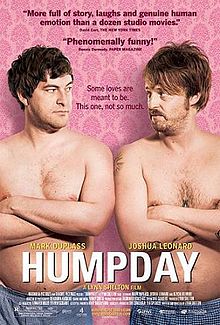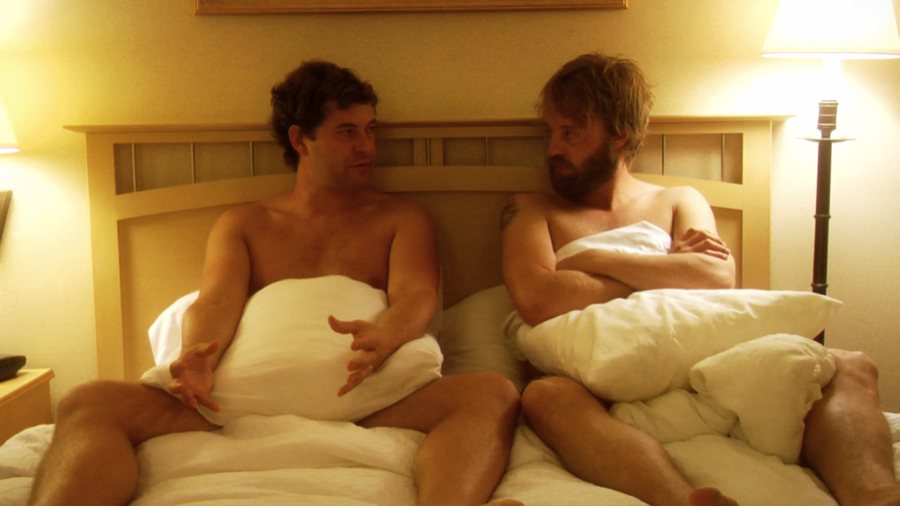(Note: This post contains spoilers about the movie Humpday.)
Image may be NSFW.
Clik here to view. What's the line between friendship and romance? This is a big question that we'll address throughout this series, but today, I want to explore it in the context of heterosexual male friendships. Specifically, I want to explore it in the context of the 21st century's offshoot of the buddy comedy—the "bromance."
What's the line between friendship and romance? This is a big question that we'll address throughout this series, but today, I want to explore it in the context of heterosexual male friendships. Specifically, I want to explore it in the context of the 21st century's offshoot of the buddy comedy—the "bromance."
Now, I do enjoy some Judd Apatow movies (let's not forget, he produced the beloved Bridesmaids), but the subgenre he's popularized can be rather frustrating. What irks me about bromance films, besides the ridiculous name, is the fact that these films not only presume Kinsey 0 heterosexuality, but they go so far as to reject even the suggestion of anything other than Kinsey 0 heterosexuality. (Or, as Sady Doyle puts it, "It's okay, Apatow movies tell their intended audience of straight men: you can love your bros, and think that they're the most important people in the world, and still think that Coldplay is for faggots.") In principle, that's okay, because there's nothing wrong with close, completely platonic male friendships. The reality, though, is that a lot of people who identify as straight have been attracted to people of the same gender at one point or another. Intimacy, whether it's between friends or lovers, is complicated. Sometimes, straight-identified men have moments of attraction toward other men—particularly men that they care about, like close friends. By building off of the word "romance," the genre is already implying a degree of intimacy that can, in some situations, be perceived and understood as romantic, and I wish bromance films were comfortable exploring that reality within their narratives.
Take Superbad, a film that I love. Superbad depicts the friendship of Seth and Evan, teenage boys preparing to graduate from high school, lose their virginities, and start college. There's a scene toward the end of the film when Seth and Evan are having a sleepover, and they drunkenly tell each other how much they love each other. It's a very touching scene, and in its way, it's an important one—it demonstrates the fact that, yes, it is okay for men to have friends that they love. But that honesty and emotion is undercut by the jokey nature of the scene. It's clearly played for laughs, and that bothers me. Why can't men who love women admit that they also love each other? Is it because they're afraid of what that love might signify?
I like to think of Humpday, an indie comedy Lynn Shelton wrote and directed back in 2009, as the story of what might happen to Seth and Evan ten years after Superbad. Humpday tells the story of Ben and Andrew, old friends who used to be extremely close but have drifted apart, as friends sometimes do. They reunite when Andrew, who lives a vagabond lifestyle, shows up at Ben's house unannounced, asking to stay over until he figures out where life is leading him next. Andrew teases Ben for his traditional lifestyle, which includes a stable job, a beautiful house, and a great wife. Ben's convinced that none of these conventions make him boring or square, but Andrew disagrees. In an attempt to prove to each other (and themselves) how cool and not square they both are, Andrew and Ben decide to enter an alternative porn festival and make a gay porn movie together. It's just for fun, they tell each other. They're close friends and they're both straight, so what could possibly go wrong?
The difference between Humpday and movies in the bromance subgenre, like Superbad, is that bromances tell the stories of platonic male friendships that deny the possibility of genuine romance and attraction. What Humpday does differently is turn that concept on its head and ask some hard questions: At what point does platonic love transition into something more? If we're so positive that we're only attracted to one gender, what's the harm in showing affection to someone who isn't that gender? Is it because we're afraid of what we might discover about ourselves in the process? Are we afraid we might actually like it, in a not-so-platonic way? And if we do, what does that mean?
Image may be NSFW.
Clik here to view. If you're a fan of queer sex comedies, don't get too excited—ultimately, Humpday plays it safe. When Ben and Andrew try to film their porn, they're able to be somewhat physical together, like kissing and hugging while shirtless, but they don't have sex. And that's okay. It didn't feel like a cop-out ending, because it felt like the decision that these two, well-developed characters would make. Ultimately, it was probably the right decision for them. (In discussing this post with friends, several reminded me of Y Tu Mamá También, a great film which also sensitively and directly addresses this topic. Needless to say, I am glad Humpday ended less awkwardly.)
If you're a fan of queer sex comedies, don't get too excited—ultimately, Humpday plays it safe. When Ben and Andrew try to film their porn, they're able to be somewhat physical together, like kissing and hugging while shirtless, but they don't have sex. And that's okay. It didn't feel like a cop-out ending, because it felt like the decision that these two, well-developed characters would make. Ultimately, it was probably the right decision for them. (In discussing this post with friends, several reminded me of Y Tu Mamá También, a great film which also sensitively and directly addresses this topic. Needless to say, I am glad Humpday ended less awkwardly.)
What I like about Humpday, that I wish more bromances attempted, is that the characters explore the idea of bisexuality at all. At one point, Ben tells Andrew about a time in his life when, out of loneliness, he found himself attracted to a male video store clerk and envisioned kissing him in a way that felt good. Though he still identifies as straight, Ben acknowledges that a small part of him has felt bisexual attraction, and that such feelings could resurface if he sleeps with Andrew. Humpday stops short of explicitly identifying Ben and Andrew as bisexual, while still allowing them space to question whether they might be.
As we know from Cynthia Nixon and others, just because someone identifies as straight or gay doesn't mean that their attractions are always 100% limited to a single gender. Human sexuality is far more complicated than that. Though I wish more mainstream films, like Apatow's bromances, would address this complexity, I'm glad that we have movies like Humpday that make the effort. Humpday reminds us that non-monosexual attraction is not limited to self-identified bisexuals, and perhaps if we were more willing to recognize this truth, the idea of bisexuality would be far less intimidating.
Related:It's all about bromance
Previously: Glee's Problem With Bisexual Men, America's Next Top Bi Icon: Introducing Laura LaFrate